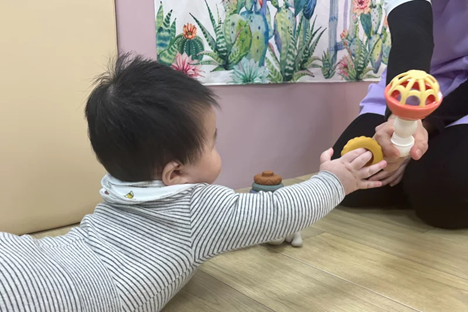Taiwan’s government says falling birthrates is a crisis, but without better childcare options, more people will opt out of raising kids
KAOHSIUNG — In the heart of Kaohsiung’s Qianjin District (前金區), a modest childcare site inside the Datong public housing complex (大同社會住宅) has become one of the city’s most important social services. Open 24 hours a day, it offers overnight care for children whose parents work late shifts, making it Taiwan’s only facility of its kind.
United Daily News reporter Dong Yu-chia (董俞佳) recently praised the center, calling it a “lifeline for parents,” noting that it often operates at full capacity on weekends. The center provides rare overnight services, requiring parents to drop children off before 8 p.m. so they can adjust to the environment before bedtime, with pick-up the following day. Similar to Japan’s 24-hour nurseries that serve entertainment districts, the Kaohsiung site has become an essential option for night-shift families.
At night, caregivers provide one-on-one attention to help children settle in. Fees are NT$1,160 (US$36) per 12 hours, with overtime billed at NT$190 per hour. For longer stays, meals and bathing services are available at additional cost. Staff generally do not ask about parents’ occupations, but it’s understood that many clients work in nearby massage parlors, nightclubs, and other late-hour businesses.
According to UDN, usage of the service rose from 114 children in 2021 to 655 last year, a sixfold increase. Overnight stays climbed from 21 to 153 over the same period — more than a sevenfold jump. Operating for nearly five years, the center closes only for Lunar New Year and typhoon days.
The Kaohsiung Childcare Workers Union (高雄市輔育人員職業工會), which runs the facility, has experimented with flexible work arrangements, even pioneering a “bring your child to work” policy to ease staffing shortages.
Advocates say the Kaohsiung program offers a practical solution to the nationwide shortage of childcare options and could be a model for other municipalities. Yet despite interest from other cities, the concept has not spread beyond Kaohsiung because of difficulties recruiting staff willing to work nights or extended shifts.
Childcare experts also point to cost and space constraints. In Taipei’s Zhongshan District (中山區), where nightlife businesses cluster, high rents would make such services nearly impossible. Strict regulations on facilities and teacher-student ratios add to the challenge.
Home-based nannies can provide 24-hour or overnight care, but fees often exceed NT$30,000 (US$930) per month. Advocacy groups have argued for targeted subsidies that could reduce the burden on single parents and those with irregular work hours.
“Taiwan’s government is deeply worried about declining birthrates,” said Liao Wen-hsiu (廖文秀), former president of the Early Childhood Education Association. “But without a comprehensive childcare plan, night-shift families will keep slipping through the cracks.”



